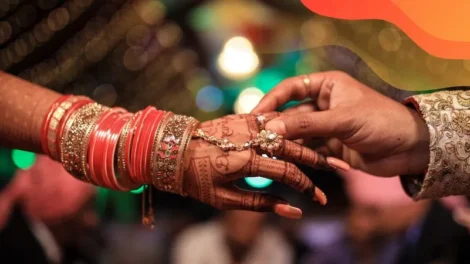Marriage, revered by many civilizations for centuries, has changed to suit modern societal realities. Is marriage too complex for living in the US? Marriage may be too complicated in the US, a country with a diverse population and changing social values. From legal issues surrounding same-sex marriage and prenuptial agreements to changing gender roles and expectations, couples face several challenges. This article will explore the issues couples confront and whether these complexities have made marriage more complicated in this melting pot nation.

Marriage in the US: A Complicated Institution
Marriage in the US is hard, with many challenges and complexity that make it unsuitable for current American society. With divorce rates rising and gender roles being challenged, marriage is no longer a surefire path to happiness.
US marriage is complicated by societal expectations. Americans are bombarded with pictures of flawless weddings and idealized love from a young age, leaving little room for uniqueness or realistic expectations. Many people join marriages with unrealistic fantasies and unstated assumptions about their partner’s position.
Table of Contents
US cultural variety significantly affects marriage. Marriages can be difficult when religions, nationalities, and lifestyles battle over commitment. Couples typically fight over child-rearing and religious habits.
All of these characteristics raise fundamental considerations regarding whether marriage is too complicated for US living. While it’s strongly engrained in American culture, perhaps we should rethink our expectations and approach to marriage to produce better couples based on true compatibility rather than lofty ideals.
Historical Context: Changing Norms and Expectations
Is marriage too complex for living in the US? This subject raises important questions concerning changing social standards and expectations. Marriage was traditionally seen as an economic transaction rather than a love or emotional bond. However, social standards now prioritize individual satisfaction and relational fulfillment.
One could argue that this transition has complicated marriage in America. Gender equality has changed marriage roles, forcing spouses to compromise. Due to changing social attitudes toward divorce, people may feel less pressure to stay in unhappy marriages, leading to increasing divorce rates.
Modern marriages might also be complicated by evolving aspirations for personal growth and self-actualization. Finding a spouse who supports their ambitions and allows for personal growth is becoming more important as people prioritize personal fulfillment. Spouses may have to manage keeping their identity while building a deep bond with their partner, which is difficult.
In conclusion, marriage complexity grows as societal norms and expectations change in the US and worldwide. Changing beliefs on love, gender roles, and personal fulfillment make romantic partnerships difficult.
Legal Complexities: Marriage Laws and Regulations
Marriage signifies love, commitment, and cooperation. The legal complexity of marriage laws and procedures can sometimes mask these profound feelings. In the US, couples planning a wedding often find it difficult to navigate legal requirements.
The enormous disparities in state marriage rules are a serious issue. For instance, some states have stricter marriage age limits than others. This complicates marriage preparation and raises problems about legal equality.
Same-sex weddings complicate matters. The 2015 Supreme Court ruling Obergefell v. Hodges has moved toward worldwide recognition of such partnerships, but states still have different adoption rights and spousal benefits for same-sex couples.
Legal complications raise the question: Is marriage too complicated for US living? Legal barriers should preserve rights and stabilize partnerships, but they shouldn’t be excessive or discriminatory. Future marriage rules and regulations in all jurisdictions should strike a balance between precaution and simplicity.
Financial Considerations: Taxes, Insurance, and Benefits
Is marriage too complex for living in the US? It may seem like a simple love and commitment decision, but financial factors might complicate it. One major consideration is taxes. Marriage changes your tax filing status, which can significantly affect your annual tax bill. Understanding how your combined income will be taxed and whether you’ll owe more or less than when you were single is crucial.
Insurance is another important part of a couple’s financial plan. Reassessing insurance coverage is necessary after marriage due to shared duties and assets. You may need to add partner coverage to your health insurance or combine auto insurance for discounts. Check life insurance to make sure both couples are covered in case of an emergency.
Finally, knowing married couples’ benefits is crucial. Knowing about joint bank accounts, Social Security benefits, and employer-sponsored spousal healthcare coverage can improve a couple’s financial well-being.
In conclusion, getting married is thrilling and gratifying emotionally, but financial issues must be considered. When marrying in the US, taxes, insurance coverage modifications, and benefits must be carefully considered.
Cultural Diversity: Navigating Different Traditions and Customs
Marriage, a deeply ingrained practice in many countries, can be challenging when navigating US conventions and traditions. The country’s melting pot of ethnicities and origins often brings together people with quite different marriage views. Some communities value planned marriages to preserve cultural heritage, while others choose love-based or non-traditional partnerships.
This intricacy can lead to contradictory emotions and choices for those trying to uphold their cultural traditions while accepting their new culture. Immigrants, especially those who have adapted to American society yet retain their cultural values, must balance both worlds. By respecting these distinctions and encouraging open conversations about marriage norms and expectations, we may build places that celebrate diversity rather than repress individuality.
Handling the complexities of numerous marriage traditions and customs is difficult but it leads to personal growth and knowledge. Through debate, education, and acceptance of different viewpoints on relationships and unions, we create an environment that values cultural variety. We foster stronger relationships between people from different backgrounds and allow multiculturalism to thrive in our communities by respecting its complexity.
Emotional Challenges: Communication and Relationship Dynamics
Communicating and maintaining healthy relationships can be emotionally difficult wherever one lives. The US’s distinct cultural background may complicate these areas of life, especially marriage.
Effective marriage communication can be difficult in today’s fast-paced environment, where couples often have numerous jobs and many responsibilities. Different expectations, unsolved issues, and unexpressed emotions might hinder communication and emotional connection. Personal autonomy above relational harmony may also contribute to these issues due to US societal influences and individualism.
Despite these difficulties, marriage is not excessively complicated in the US. Couples can improve their relationships by adopting a growth mentality and acknowledging that communication takes practice for everyone. Making time for quality conversations, setting realistic expectations based on mutual respect and understanding, and actively listening to their partner’s feelings without judgment or defensiveness can help couples overcome emotional challenges in their marriages, regardless of location.
Social Pressures: Expectations and Judgment from Others
Marriage is venerated in most civilizations, but living in the US makes its complexities clear. Social standards require adults to select a life partner and settle down. Although marriage can bring joy, friendship, and stability, it’s important to consider if these expectations are essential or good for everyone.
Relationships are deeply intimate and cannot be classified or measured by society. The complications of modern life have made many rethink whether they should follow the traditional marriage paradigm. Instead of giving in to external demands, people are considering long-term unions or not marrying. These choices let people prioritize their own happiness and fulfillment without social pressure.
The question is: is it fair for society to set such high standards for successful relationships? Perhaps we need a cultural revolution where our ideas don’t affect someone’s marriage or singlehood. By embracing other ideas and challenging conventional relationship success, we may find new ways to grow and be happy outside of societal expectations. Each person must choose what kind of connection provides them with true happiness rather than conforming out of fear or obligation.
Conclusion: Is Marriage Too Complex For Living in The US?
US marriage complexity has been extensively studied and examined. With rising divorce rates, changing social standards, and competing expectations, many people wonder if marriage is too complicated for the US. Marriage is complex, but complexity does not preclude possibilities.
US marriage may seem complicated due to the country’s different cultural origins and beliefs. From religion to values, spouses may have different opinions. As expectations and societal conventions differ, communication and understanding can be difficult. Instead of seeing these complexities as insurmountable challenges, we should use them to develop and learn.
Modern relationship expectations and demands complicate American marriage. In a society that values accomplishment and uniqueness, couples are under pressure to keep their marriages happy and fulfilled. Technology also allows unending comparison with others’ supposedly perfect lives on social media, which showcases idealized relationships. We can traverse this complexity more smoothly by identifying these external factors and focusing on open communication, emotional support, and mutual respect in marriages rather than perfection.



Good post and right to the point. I don’t know if this is
actually the best place to ask but do you people have any
idea where to employ some professional writers?
Thanks 🙂